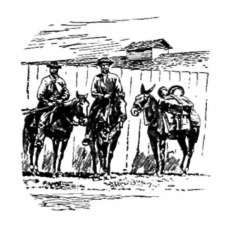Camping And Hunting In The Shoshone. Part 10
Description
This section is from the book "Hunting", by Archibald Rogers. Also available from Amazon: Hunting.
Camping And Hunting In The Shoshone. Part 10
Though a guide is not a necessity, a couple of first-class packers are. Any man, with some little experience of roughing it, can guide a party fairly well; but no mortal man, not to the manner born, can pack. No baby is more dependent on its mother than is the tenderfoot upon his packer. Day after day he stands, in wondering admiration, and sees this individual "throw" the marvellous diamond hitchknot that fastens, as nothing else can fasten, the strange assortment of everything, from a Dutch oven to a stag's head, that may chance to form the pack; and when he has mastered the secret of the diamond hitch, he is still years from being a thorough packer. To see all the impedimenta of a hunting-camp for a party of four travellers and their men quickly done up into the neatest and tightest packages imaginable, and then bound, as none but a Westerner can bind them, on the back of an ill-conditioned Indian pony, to stay there, as I have seen packs stay, all day long, with just one tightening up, as up and down we go over rocks and against trees, is a wonderful instance of skill and careful planning.
Some days, of course, the packs won't "ride;" sometimes the devil has completely mastered the natures of horse and mule, as long ago he did the pigs. We once started from Big Timber Station across a level and stony plain, at five o'clock sharp, on a sweltering August morning. By four that evening we had made precisely two and a half miles. I think the outfit's survival as an outfit on that occasion is due to the fact that the clear stream of the Bowlder (full of trout, by the way) did not flow another quarter of a mile farther off from our starting-point than it did. I never had better packers or better animals than those we had for that trip; but we put too much on the mules. They were a splendid band, but had not been packed for two years, and so were soft and resented packing; and there just happened to be an evidence of advancing civilization, in the shape of half a mile of the newest and most barby barbed-wire fencing, midway between the railroad and the woody bend of the stream that was the goal of all our hopes. Against that half-mile of wire every one of those mules in turn lay down, stringing themselves well out, so that they would not be inconveniently close together, this manoeuvre, of course, resulting in the rending and cutting of all that was cuttable about them, including their hides; and, in all honesty—for one must try to be honest even to a pack-mule —I must say, they rather seemed to like to have their hides cut, if they were only sure of cutting every flour, sugar, oatmeal, and coffee sack, to say nothing of letting daylight into waterproof, tarpaulin, clothes, etc.
It is something to have had an exhaustive experience of any sort; and after going through those eleven hours of unceasing toil, during which I had ample opportunity to see what a mule could do, and to hear how thoroughly trained mule-packers could express their sentiments regarding everything and every person in general, and those immediate mules and circumstances in particular, I have no hesitation in affirming that in both these directions my experience is exhaustive.
Dead-beat and almost dumb, one of the men, sitting on a newly prostrate mule's head, summed up the situation concisely as he said, glancing at me reproachfully, "It's enough to make a minister of the gospel swear;" and had I gone through half the poor fellow had endured, I have no doubt I should have agreed with him.

Continue to:
